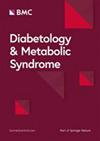血红蛋白糖化指数与糖尿病肾病患者全因和心血管疾病死亡率的关系:一项队列研究
IF 3.4
3区 医学
Q2 ENDOCRINOLOGY & METABOLISM
引用次数: 0
摘要
虽然高血红蛋白糖化指数(HGI)已在糖尿病人群中得到广泛研究,但其对糖尿病肾病(DKD)患者的影响仍不清楚。我们研究了 1999 年至 2018 年间进行的美国国家健康与营养调查(NHANES)的数据。HGI 采用 Hempe 等人推荐的公式确定,该公式计算测量 HbA1c 与预测 HbA1c 之间的差值。预测 HbA1c 的计算公式为0.024 FPG + 3.1。利用截至 2019 年 12 月 31 日的全国死亡指数记录来评估死亡率结果。为了估算全因死亡率和心血管疾病(CVD)死亡率的危险比(HRs)和 95% 置信区间(CIs),我们采用了 Cox 比例危险模型。为了探索 HGI 水平与死亡率之间潜在的非线性关系,我们还进行了限制性三次样条分析。我们的队列研究包括 1,057 名 DKD 患者的数据(平均 [SE] 年龄为 61.61 [0.57] 岁;48.24% 为女性)。平均 HGI 水平为 0.44(SE 0.04)。在 6.67 年的中位随访期内,我们观察到 381 例死亡,其中 140 例死于心血管疾病。与 HGI 水平第二三分层(0.03-0.74)的参与者相比,HGI 最低三分层(-5.29-0.02)的参与者的全因死亡率危险比为 1.39(95% CI,1.02-1.88),心血管疾病死亡率危险比为 1.10(95% CI,0.67-1.81)。相反,在进一步调整 HbA1c 和其他重要变量后,最高三分位数(0.75-9.60)的参与者的全因死亡率危险比为 1.48(95% CI,1.05-2.08),心血管疾病死亡率危险比为 2.06(95% CI,1.13-3.77)。此外,限制性立方样条分析显示,HGI 与全因死亡率呈 U 型关系(非线性 P < 0.001),HGI 与心血管疾病死亡率呈 J 型关系(非线性 P = 0.044)。我们的队列研究表明,DKD人群中的HGI与全因死亡率呈U型关系,与心血管疾病死亡率呈J型关系,与HbA1c水平无关。本文章由计算机程序翻译,如有差异,请以英文原文为准。
Association of haemoglobin glycation index with all-cause and cardiovascular disease mortality in diabetic kidney disease: a cohort study
While the high haemoglobin glycation index (HGI) has been extensively investigated in diabetic populations, its impact on patients with diabetic kidney disease (DKD) remains unclear. We examined data from the National Health and Nutrition Examination Surveys (NHANES) conducted between 1999 and 2018. HGI was determined using the formula recommended by Hempe et al., which calculates the difference between measured and predicted HbA1c. Predicted HbA1c was derived from the equation: 0.024 FPG + 3.1. National death index records up to December 31, 2019, were utilized to assess mortality outcomes. To estimate hazard ratios (HRs) and 95% confidence intervals (CIs) for both all-cause and cardiovascular disease (CVD) mortality, we utilized Cox proportional hazard models. A restricted cubic spline analysis was performed to explore the potential nonlinear relationship between HGI levels and mortality. Our cohort study comprised data from 1,057 participants with DKD (mean [SE] age, 61.61 [0.57] years; 48.24% female). The mean HGI level was 0.44 (SE 0.04). Over a median follow-up period of 6.67 years, we observed 381 deaths, including 140 due to CVD. Compared with participants in the second tertile of HGI levels (0.03–0.74), those in the lowest tertile of HGI (-5.29–0.02) exhibited an all-cause mortality hazard ratio of 1.39 (95% CI, 1.02–1.88) and a CVD mortality hazard ratio of 1.10 (95% CI, 0.67–1.81). Conversely, participants in the highest tertile (0.75–9.60) demonstrated an all-cause mortality hazard ratio of 1.48 (95% CI, 1.05–2.08) and a CVD mortality hazard ratio of 2.06 (95% CI, 1.13–3.77) after further adjusting for HbA1c and other important variables. Additionally, a restricted cubic spline analysis revealed a U-shaped relationship between HGI and all-cause mortality (P < 0.001 for nonlinearity) and a J-shaped relationship between HGI and CVD mortality (P = 0.044 for nonlinearity). Our cohort study suggests that HGI in DKD populations exhibits a U-shaped association with all-cause mortality and a J-shaped association with CVD mortality, independent of HbA1c levels.
求助全文
通过发布文献求助,成功后即可免费获取论文全文。
去求助
来源期刊

Diabetology & Metabolic Syndrome
ENDOCRINOLOGY & METABOLISM-
CiteScore
6.20
自引率
0.00%
发文量
170
审稿时长
7.5 months
期刊介绍:
Diabetology & Metabolic Syndrome publishes articles on all aspects of the pathophysiology of diabetes and metabolic syndrome.
By publishing original material exploring any area of laboratory, animal or clinical research into diabetes and metabolic syndrome, the journal offers a high-visibility forum for new insights and discussions into the issues of importance to the relevant community.
 求助内容:
求助内容: 应助结果提醒方式:
应助结果提醒方式:


